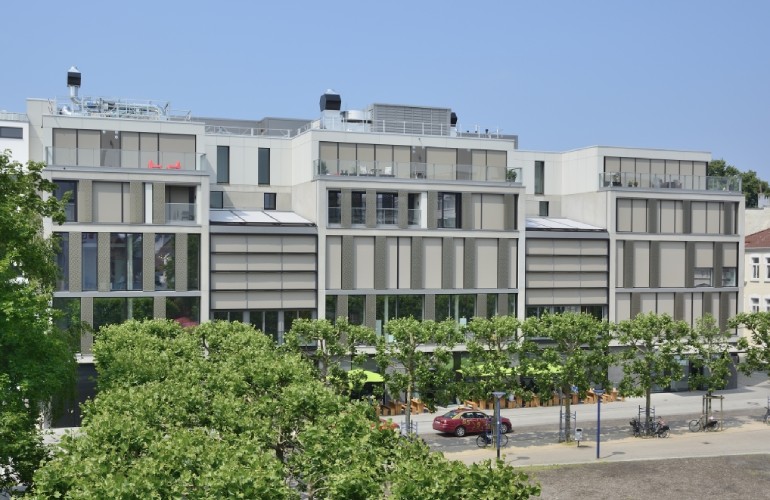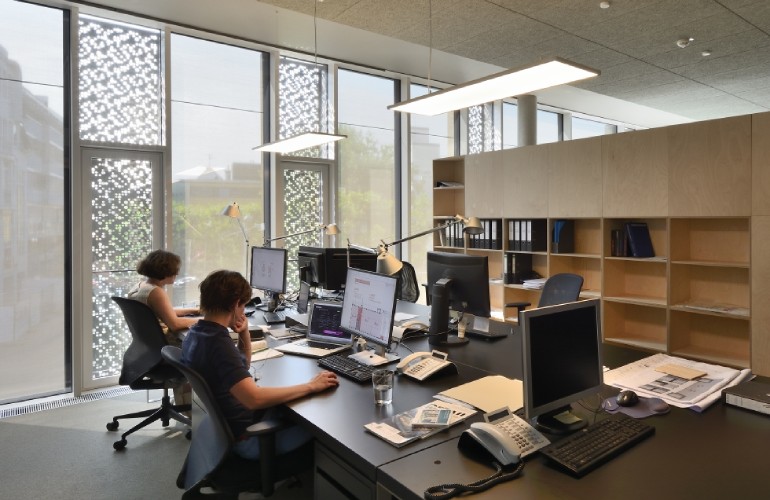By investing in large windows, and in ventilation and sun protection - fairly simple measures, when you think about it - you can turn your indoor space into a healthy working environment. In the long term, everyone will benefit; you’re bound to see a huge return on your investment
You can feel it in the air: creating healthy offices
Indoor climate quality has a huge effect on people’s well-being and productivity: a fact that cannot be ignored, considering that we spend 90% of our time indoors. Harvard University carried out a survey of 1600 employees at different companies, asking them which aspects made them happiest at the office. Indoor air quality, sufficient light, comfortable temperatures, and the option to personalize their work environment were the most frequent responses.
Bringing natural elements indoors
Take another look at those answers and you’ll soon realise they all relate to the same thing: bringing natural elements into the office environment. Healthy outside air, a preference for daylight over artificial light, and pleasant temperatures - meaning no air conditioning, which creates dry air and blasts unhealthy, ice-cold air onto the back of your neck all day long.
Lower absenteeism, higher productivity
According to the survey (the results of which are available here), employers who invest in measures to keep their indoor climate healthy are seeing lower rates of absenteeism: up to four days less per employee per year. Just think about what this means in terms of cost savings for a medium to large business of 100 to 1,000 employees. But that’s not all; employees in a healthy work environment are up to 16% more productive than employees in a poor indoor climate. In other words, investing in a healthy indoor climate pays significant dividends by creating a win-win situation for both the employer and its employees.
Unhealthy offices: the how and why
Unfortunately, the indoor climate in offices is often a lot unhealthier than people suspect. In summer, indoor temperatures frequently soar to unbearable levels. Office air is often heavily polluted too: carpets are full of fine dust, and after the cleaners have hoovered, all that dust is blown up into the very air we breathe. In addition, indoor air is teeming with volatile organic compounds (VOCs): minuscule particles floating through the air that are harmful to us if breathed in. More specifically, VOCs include glue and paint particles, fine dust emitted by printers, and so on. As a result, employees often complain of headaches, feel drowsy, or experience respiratory problems—all of which lead to lower productivity. This phenomenon even has a name: the ‘sick building syndrome’. According to Lode Godderis, a professor in occupational medicine at KU Leuven, “the air we breathe indoors is dirtier than the air outdoors, even on days with heavy air pollution”.

Measures against poor indoor air quality
As such, it is essential to ensure buildings are properly ventilated. Opening the windows certainly works—but only for a while. What’s really needed is constant ventilation throughout the building. That’s why we recommend that offices are fitted with natural ventilation solutions, such as Renson Invisivent, for example. Invisivent is a window vent that brings a high flow of air into the building. In addition, the louvres are soundproofed, meaning the workplace remains delightfully quiet.

Large windows allow a huge amount of light to enter, which is never a bad thing, of course—but they do allow the sun to play havoc with the indoor temperature. By integrating outdoor blinds into the building and keeping them shut on sunny, warm days, the office will remain pleasantly cool all day long. The other advantage of Renson screens is that while they certainly keep out the sunlight, they do not block the view or daylight.
Renson’s Fixvent offers the perfect solution, combining sun protection and ventilation. This isn’t just beautifully simple in terms of functionality; it’s cheaper, too. If you combine all this with a Renson Healthconnector, you’ll have a smart, demand-driven system that regulates the amount of CO2 in the building.
Holding outdoor meetings
By investing in large windows, and in ventilation and sun protection - fairly simple measures, when you think about it - you can turn your indoor space into a healthy working environment. In the long term, everyone will benefit; you’re bound to see a huge return on your investment
